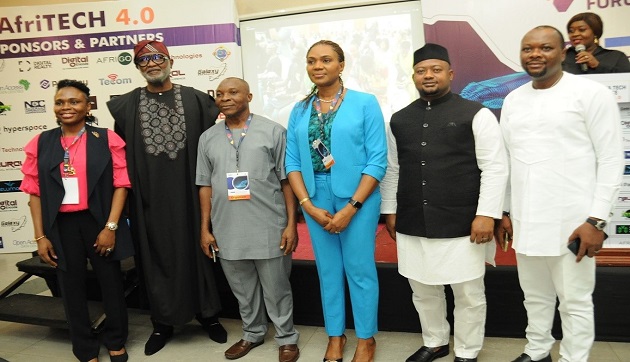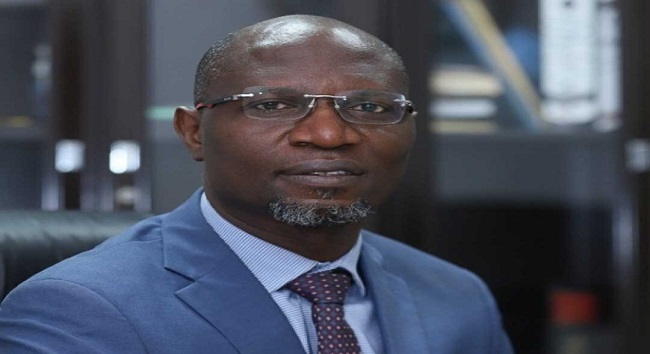News
Experts Highlight Blockchain, AI, eCommerce Potentials for Africa @ AfriTECH 4.0

Technology experts at the Africa Tech Alliance Forum (AfriTECH 4.0) held in Lagos State-Nigeria, recently, highlighted the transformative potential of blockchain and AI in positioning Africa as a global technology leader.

Kashifu Inuwa Abdullahi, the director-general of the National Information Technology Development Agency (NITDA), in his keynote address, titled “Blockchain Technology & AI: Positioning Africa for the Future,” emphasized Africa’s unique position to leverage these technologies for economic and social development.
With mobile penetration at about 80% and a rapidly growing youth population, Africa, he noted, is fertile ground for digital transformation, noting that Blockchain and AI offer unparalleled opportunities to propel Africa into the future as a leader in the global digital economy.
“Both blockchain and artificial intelligence are powerful technologies that offer Africa unprecedented opportunities. By strategically integrating these technologies, we can propel Africa forward as a dynamic leader in the global digital economy,” he said.
Abdullahi who was represented at the event by Mrs. Rita Shoremi, Head, Startup Innovations and IT solutions, NITDA, South West Zone, outlined the potential of blockchain to address challenges in financial inclusion, governance, and property rights across the continent arguing that with over 57% of Africans unbanked, blockchain can extend financial services to underserved regions, adding an estimated $300 billion to Africa’s GDP by 2025.
“Africa stands at a unique juncture. Our continent has seen remarkable digital growth, with mobile phone penetration reaching 80% across sub-Saharan Africa according to a World Bank, 2022 report.
“Africa is also home to one of the world’s fastest-growing youth populations, over 60% of whom are under the age of 25 by a UN Population Data of 2022. These dynamics offer a fertile ground for digital transformation, and emerging technologies like blockchain and AI have the potential to redefine key sectors that fuel Africa’s economy,” Abdullahi stated.
To fully capitalize on blockchain and AI, Abdullahi emphasized the need for supportive policies, strategic partnerships, and youth empowerment and noted that NITDA’s eight-pillar strategy aligns with Nigeria’s goals for digital literacy, infrastructure access, and global research collaboration, with a goal of achieving 70% digital literacy by 2027.
In his presentation titled “Navigating The Future of Technology In Africa: The Intersection of AI, Blockchain, Cryptocurrency and Cybersecurity,” Dr. Obadare Peter Adewale, the chief visionary officer, Digital Encode Limited, examined adoption trends, industry impact, and the key challenges across these technologies.
Taking an overview of Emerging Technologies in Africa, Obadare who was represented by Oluwakayode Olatunji, CISO and Group Head of Information Security at Digital Encode Limited stated that Africa’s digital transformation is accelerating in key sectors like fintech, healthtech, and agritech that are adopting cutting-edge technologies such as AI, blockchain, and cryptocurrencies.
According to him, whereas mobile penetration, cloud computing, and increasing internet access are driving the growth of these technologies, these innovations come with risks and threats associated with cyberattacks, fraud, and data breaches and cautioned that a robust cybersecurity framework is crucial for sustainable digital transformation.
On his part, Mr. Biram Fall, the Regional General Manager, QNET Sub-Saharan Africa, said that with over 350 million unbanked adults, there is a significant potential of financial inclusion and digital solutions for Africa, and a vast opportunity to expand access to financial security, event through electronic commerce (eCommerce).
Speaking as a lead presenter at the AfriTECH 4.0, Mr Fall stated that financial inclusion transforms lives by providing essential financial tools like savings accounts, credit, and insurance, which foster economic independence.
Highlighting the importance of the Forum’s theme, “Harnessing Fintech Solutions for Financial Inclusion & eCommerce Growth,” he said”: “The demand for financial inclusion aligns with a projected $75 billion e-commerce market in Africa by 2025, driven by rising internet access and smartphone adoption. However, limited banking infrastructure and high cash dependency hinder digital engagement,” he said.
He disclosed that QNET’s initiatives, such as its “Fit Green” financial literacy programme, have trained over 1,500 young Nigerians, promoting financial self-sufficiency and entrepreneurship through an e-commerce-driven direct-selling model active in over 100 countries.
“Our e-commerce driven direct-selling model provides income-generating opportunities in over 100 countries, promoting entrepreneurship and self-sufficiency in low-income regions. True progress requires collaboration.
Prof. Ibrahim Adeyanju, the Managing Director/Chief Executive Officer of Galaxy Backbone, underscored the importance of building sustainable digital infrastructure to fuel Africa’s economic transformation.
Presenting a paper titled: Building Digital Infrastructure for a Sustainable Digital Economy, through a representative, Mr. Nnamdi Onoh, Field Service Engineer at Galaxy Backbone, Prof. Adeyanju noted that technology has the potential to redefine Africa’s economic trajectory, and that at Galaxy Backbone, they are dedicated to building the foundational digital infrastructure that supports this vision.
According to him, “Africa’s digital journey presents immense opportunities, but it requires robust, scalable, and sustainable infrastructure to enable economic growth. Galaxy Backbone’s mission aligns directly with these goals, as we work to provide the infrastructure and connectivity that powers government services, businesses, and communities across Nigeria.”
He said that today, digital infrastructure is much more than just technology but about creating resilient systems that empower citizens, foster economic empowerment, and drive inclusive growth. “Our investments in state-of-the-art data centres, fibre optic networks, state of the art SOC and secure cloud solutions have created a backbone that supports Nigeria’s public sector and enables interconnectivity among MDAs,” he said.
Nodding in agreement, Mrs. Ebehijie Momoh, the chief executive officer of AfriGoPay Financial Services Limited, said that the company, working with Nigerian banks and the Central Bank, aims to reduce payment processing costs, thus supporting the nation’s financial inclusion goals
Momoh noted that with a population exceeding 220 million and mobile penetration reaching a notable 90%, Nigeria is well-positioned for a digital transformation that supports a burgeoning economy, adding that over 103 million Nigerians, or 45.5% of the population, are now internet users, underscoring the potential for digital growth.
“According to a 2023 report, the country’s financial inclusion rate rose to 64%, an impressive increase from the 50s just two years prior. This growth is driven in part by the Central Bank of Nigeria’s (CBN) initiatives focused on financial inclusion, fostering an environment where more Nigerians can access essential financial services,” she said.
The AfriGoPay Chief Executive expressed delight that Nigeria’s digital payments landscape is also experiencing rapid expansion, with 2023 alone seeing an estimated $730 billion in transactions and noted that the advent of domestic payment solutions, like the recently launched AfriGo card, represents a home-grown option that facilitates cashless payments.
“The AfriGo card, developed in collaboration with Nigerian banks and the CBN, is designed to reduce costs by processing transactions in local currency instead of foreign exchange, thus supporting the nation’s financial inclusion goals.
AfriTECH 4.0 attracted both physical and virtual attendees from Nigeria, Kenya, Egypt, United Kingdom, United States, South Africa, amongst others.
News
SEC Cracks Down on Influencers, Bloggers Promoting Fraudulent Investment Schemes

Securities and Exchange Commission (SEC) has issued a stern warning to social media influencers, bloggers, and celebrities, urging them to desist from promoting unregistered and fraudulent investment schemes. The warning was issued by the SEC’s Director-General, Dr Emomotimi Agama, in a notice released on Sunday in Abuja.

Dr Agama noted that the Commission is working in close collaboration with the Economic and Financial Crimes Commission (EFCC), the Nigeria Police Force, and other relevant government agencies to identify and prosecute those found guilty of flouting investment regulations.
Highlighting the provisions of the newly enacted Investments and Securities Act (ISA) 2025, Dr Agama said the law specifically targets the promoters of unregistered investment schemes, including individuals who use their platforms to endorse such ventures.
“The law also covers influencers and bloggers who promote fraudulent schemes, with clear penalties, including imprisonment,” he stated.
Citing the recent collapse of CBEX—a digital investment platform accused of defrauding Nigerians of over ₦1.3 trillion—Agama described the incident as a stark reminder of the dangers posed by unregulated financial platforms. CBEX allegedly promised unrealistic returns and falsely claimed international partnerships.
“The collapse of CBEX underscores the urgency of our crackdown. We are shutting down their operations, and the promoters will face the full weight of the law,” he added.
Agama reiterated the Commission’s resolve to protect investors and develop Nigeria’s capital market. He urged Nigerians to verify any investment opportunity with the SEC before committing their money, advising: “If it sounds too good to be true, it probably is.”
He also reassured the public of the SEC’s capability to detect and shut down Ponzi schemes, stating, “We have dealt with similar schemes in the past and will continue to do so, leveraging the powers of the ISA 2025 to safeguard investors.”
In a bid to strengthen regulatory oversight, the SEC has established dedicated departments tasked with monitoring market activities and conducting inspections aimed at detecting irregularities early.
“These proactive measures are designed to prevent large-scale frauds like CBEX from recurring,” Dr Agama said.
He concluded by emphasising the significance of the ISA 2025 as a critical tool in securing the Nigerian investment landscape and building a resilient and transparent financial market.
News
SERAP Files Lawsuit Against NBC Over Ban on Eedris Abdulkareem’s Protest Song Tell Your Papa

Socio-Economic Rights and Accountability Project (SERAP) has filed a lawsuit against the National Broadcasting Commission (NBC) over its ban on Eedris Abdulkareem’s song Tell Your Papa, which allegedly criticizes President Bola Tinubu’s economic policies.

The NBC prohibited the song from being aired on radio and television, citing its “objectionable nature” and violation of “public decency standards.” SERAP, however, argues that the ban is arbitrary, illegal, and unconstitutional.
In the suit numbered FHC/L/CS/797/2025 filed at the Federal High Court in Lagos, SERAP is seeking an order to nullify the ban, describing it as inconsistent with the rights to freedom of expression, access to information, and media freedom. The group is also requesting a perpetual injunction to prevent NBC or any other authority from barring the song from being aired on broadcast platforms across Nigeria.
According to SERAP, the NBC’s April 9 directive to all broadcast stations banning the song is unlawful and incompatible with constitutional and international human rights standards. The organization states that censorship under the guise of “protecting public decency” cannot justify suppressing dissent or political commentary.
SERAP emphasizes that freedom of expression includes not only agreeable ideas but also those that challenge, shock, or disturb. It argues the ban has a chilling effect on artistic freedom and public discourse, noting that the NBC has not demonstrated any specific harm that the song might cause to legitimate state interests.
The group also challenges Section 3.1.8 of the Nigeria Broadcasting Code, describing it as overbroad and excessively intrusive. It argues that vague standards like “objectionable content” and “public decency” should not serve as pretexts for suppressing music critical of government policies.
Filed on behalf of SERAP by lawyers Kolawole Oluwadare, Oluwakemi Agunbiade, and Valentina Adegoke, the suit insists that all individuals have the right to freedom of expression and artistic creativity. The ban, they argue, fails to meet legal standards of necessity and proportionality.
Art, SERAP notes, plays a vital role in democratic societies by fostering dialogue, counter-narratives, and reflection on societal issues. Suppressing such expression stifles debate and undermines democracy.
The organization maintains that NBC’s action violates Section 39 of the 1999 Constitution, Article 9 of the African Charter on Human and Peoples’ Rights, and Article 19 of the International Covenant on Civil and Political Rights (ICCPR), to which Nigeria is a signatory.
Article 19 of the ICCPR protects the right to freedom of expression, including the freedom to seek, receive, and impart information and ideas in any form, including art. SERAP warns that unjustified censorship not only harms artists but also weakens public engagement, artistic livelihoods, and democratic culture.
News
Airtel Smartcash Set to Power Stress-Free Easter with Seamless Cashflow

As Nigerians prepare to celebrate Easter with loved ones across the country, leading mobile money operator Smartcash Payment Service Bank (PSB) has announced an easier system by which customers may upgrade their wallets from Tier 1 to Tier 3 for a smooth, cashless, and stress-free holiday experience.

Offering improved security, access, and reliability, the Smartcash app now enables instant verification with customers’ NIN or BVN, secure facial recognition with a selfie, and simplified address confirmation.
Upgrading from Tier 1 wallet provides higher transaction limits and access to more features and benefits as well as security.
According to the Chief Executive Officer of Smartcash PSB, Tunde Kuponiyi, Smartcash is concerned with ensuring a stress-free experience for customers.
“As the Easter season approaches, we recognize the financial pressure and logistical challenges that often come with holiday spending and mobility. That’s why we’re committed to ensuring that our users can carry out essential transactions from bank transfers to merchant payments quickly, safely, and conveniently.
“Our goal is to eliminate the stress of cash handling, long queues, and bank branch visits, so that Nigerians can truly focus on the spirit of the season connection, community, and celebration,” he said.
Smartcash PSB is providing a reliable, cashless alternative that meets the financial needs of users wherever they are. Whether it’s sending money to loved ones, paying at local markets and stores, or topping up airtime and data, Smartcash users can look forward to uninterrupted and efficient services throughout the holiday season.
Airtel Smartcash PSB, which launched as part of Airtel’s commitment to deepen financial inclusion, has rapidly expanded its network of agents and digital wallet users, bridging access between underserved communities and the financial system.
With services available through mobile phones and human agents across Nigeria, Smartcash offers a simple and accessible entry point into the digital economy particularly for small-scale traders, artisans, rural dwellers, and other players in the informal sector.

 Telecom1 day ago
Telecom1 day agoMTN Nigeria Takes Broadband Services to the Next Level with FibreX Launch

 News1 day ago
News1 day agoSERAP Files Lawsuit Against NBC Over Ban on Eedris Abdulkareem’s Protest Song Tell Your Papa

 E-Financial1 day ago
E-Financial1 day agoFCMB Group Redefines Corporate Storytelling with The Power Of The Group TVC

 E-Financial6 hours ago
E-Financial6 hours agoCBN, NGX Group Defend Economic Reforms at Nasdaq

 General News6 hours ago
General News6 hours agoEFCC Clarifies SCUML Certificate Misuse Amid CBEX Ponzi Scheme Scandal

 Telecom5 hours ago
Telecom5 hours agoDigital Transformation Remains Africa’s Gateway to Economic Advancement – Adumike

 Telecom6 hours ago
Telecom6 hours agoPAFON 2.0: Experts Discuss Pathways to Boost Financial Inclusion in Nigeria

 E-Business6 hours ago
E-Business6 hours agoGold Hits Record High Amid U.S. Dollar Weakness and Trade Tensions

























